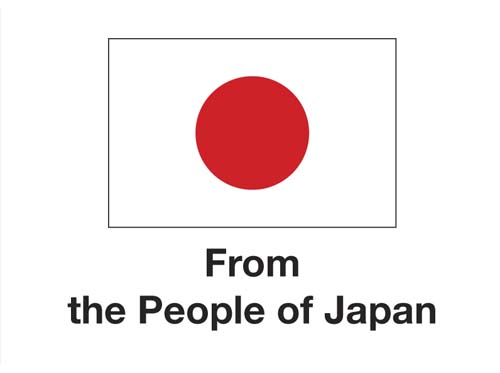
Improving National Sargassum Management Capacities in the Caribbean
This project aims to support the enhancement of the national capacity for the management of sargassum inundations by providing five (5) small island developing states in the Eastern Caribbean with equipment, expertise, and technical knowledge to collect, remove, transport, and dispose of sargassum accumulated on shore and/or in the nearshore.

5
Countries
Barbados, St. Kitts & Nevis, Saint Lucia, St. Vincent and the Grenadines, Trinidad and Tobago
3
Years
Duration: March 2022 - Feb 2025
12.5
million
Project Budget (USD)
Funding by the Government of Japan
Since 2011, massive, episodic influxes of floating sargassum seaweed inundating Caribbean shorelines have manifested as an emergent coastal hazard and a recurring external shock to the systems of Caribbean Small Island Developing States (SIDS). According to the 2021 UNEP Sargassum White Paper, Caribbean territories can receive as much as 100 metric tonnes of sargassum per kilometre of beach per day during an inundation event. These influxes lead to inundations of shorelines, resulting in economic losses across various sectors while also creating social and health issues for many coastal communities. In addition, coastal ecosystems have been negatively impacted by both the fresh and decaying seaweed. The challenges is compounded by the fact that timing and quantities of inundations are difficult to predict. This phenomenon, when paired with the adverse effects of climate change – such as sea level rise, ocean acidification, and other coastal hazards, increases the pressure on vulnerable coastal zones. SIDS are especially vulnerable to such external shocks, and typically struggle with the capacity to mount a response.
The project aims to support the enhancement of the national capacity for the management of sargassum seaweed by providing five (5) countries in the Caribbean with equipment, expertise, and technical knowledge to collect, remove, transport, and dispose of accumulated/stranded sargassum to mitigate the reoccurring threat posed. This initiative will boost marine and nearshore coastal conservation efforts, support integrated coastal management actions, and mitigate negative impacts on sectors such as fisheries, public health, and tourism with consideration for including gender dimensions where possible.
The project will achieve this primarily through the purchase of sargassum removal and collection machinery, which will be complemented and supported by relevant gender responsive training and capacity development programmes. Supporting activities will include increasing capacity in scientific monitoring of sargassum inundation quantities, development of sargassum collection and management plans, training in removal, transport and disposal of sargassum, and facilitation of regional dialogues, communications, sharing experiences and lessons learnt.
The project also seeks to identify downstream opportunities for MSME’s on the use of freshly harvested sargassum collected prior to decomposition. To this end, the project will seek to leverage partnerships with the UNDP Blue Accelerator Lab and other strategic partners in the region.
Real Talk or Hype: Sargassum Symposium Recap
Since the emergence of sargassum inundations as major external shocks affecting the Caribbean, there has been significant interest and active research in using or ‘valorising’ sargassum. This includes both academic research and business-oriented research and development. Most the work focuses on the processes for converting the sargassum, as a raw material, into commercially viable products. There is some indication that sargassum could be used as a raw material in a wide range of products, including among others, fertilizer, biofuels, building materials and soap. This very dynamic ‘sargassum space’ is also replete with various actors promoting a range of offerings including products and services marketed as solutions to the sargassum problem. There is a potentially receptive market, with governments and stakeholders keen for solutions. However, so far, interest and offerings have not translated into tangible outcomes. For those trying to understand why, the dynamic nature of the space becomes part of the challenge – information overload, noise and hype can obscure reality.
With this panel, we aim to bring some ‘real talk’ to cut through the hype and noise. We contend that the real question is not ‘can we find uses for sargassum?’ – because it seems like we can – but rather ‘can we implement the use of sargassum at a large enough scale to alleviate the problem?’ We look at the issue of scale and unpack the key factors in the feasibility of upscaling.
Catch the recording to join our panel of experts from across multiple disciplines for a focused and illuminating discussion on this central question in addressing the problem of sargassum inundations. Thank you to Sen. Crystal Drakes, Mark Hill, and Prof. Oxenford (CERMES), along with our own Dr. Mohammad Nagdee and Karima Degia for their panel contributions.
Congratulations to UWI-CERMES on an exciting and informative 3rd Sargassum Symposium, and many thanks for your support and the opportunity to collaborate on this panel discussion.
Managing Sargassum Shoreline Inundations: A Toolbox
UWI-CERMES is thrilled to announce the release of Managing Sargassum Shoreline Inundations: A Toolbox, Volume 5 in the SargAdapt Good Practice Guide Series, for public sector managers and private sector businesses directly managing the sargassum problem. We aim to provide a balanced combination of technical and practical guidance to help you identify the available tools and resources, factor in the key considerations for operational planning, and select equipment for clearing and harvesting if you take that route. This release builds on the recently concluded 3rd Sargassum Symposium held in March. Many thanks the SargAdapt Project Team and contributing authors, including from the UNDP-Japan Sargassum Project. Sargassum management is an evolving practice, and we welcome your feedback and input to update and improve future guidance products.

 Locations
Locations

